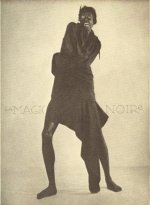Typh0n
clever fool
- Joined
- Feb 13, 2013
- Messages
- 3,497
- Instinctual Variant
- sx/sp
I had read Nietzsche back in the day, and had com accross this quote;
I recently read this to a relative of mine and she said she thought it was weird that such a proficient thinker would consider thinking outside the norm to be a result of "evil inclinations". I find it odd too, but oddly appealing, as well, as I like to play devil's advocate and push unorthodox arguements in discussions, partly because I belive "popular knowledge" to be categoraically false and empty, but also because I like to watch people's reactions to controversial ideas. I do not defend ideas I do not believe in for the sake of being a shock-jock however, so I dunno. I think its part of the fun, to stir things up and cause intellectual controversy, but not for the sake of creating chaos in itself - what would be the point of that? So despite my love of playing devil's advocate I feel I am doing it with good intentions - to cause people to think people and possibly rethink their views(though its not possible with some, and with those people I just don't bother).
What about you, if you like to adopt unothodox opinions and think outside the norm ; why do you do it? Do you get pleasure out of doing it? What do you think Nietzsche meant here? Is it a reference to something specific(like a specific person)?
Heresy and witchcraft. - To think otherwise than is customary is much
less the effect of a superior intellect than of strong, evil inclinations -
detaching, isolating, defiant, gloating, and malicious inclinations.
Heresy is the adjunct of witchcraft and surely no more harmless and
least of all anything venerable. Heretics and witches are two species of
evil people; what they have in common is that they also feel evil but are
impelled by an unconquerable lust to harm what is prevailing (people or
opinions). The Reformation, which was a kind of redoubling of the
medieval spirit at a time when it was no longer accompanied by a good
conscience, produced both in the greatest abundance.
-Friedrich, Nietzsche, the Gay Science, translation Josefine Naukhoff, aphorism 35
less the effect of a superior intellect than of strong, evil inclinations -
detaching, isolating, defiant, gloating, and malicious inclinations.
Heresy is the adjunct of witchcraft and surely no more harmless and
least of all anything venerable. Heretics and witches are two species of
evil people; what they have in common is that they also feel evil but are
impelled by an unconquerable lust to harm what is prevailing (people or
opinions). The Reformation, which was a kind of redoubling of the
medieval spirit at a time when it was no longer accompanied by a good
conscience, produced both in the greatest abundance.
-Friedrich, Nietzsche, the Gay Science, translation Josefine Naukhoff, aphorism 35
I recently read this to a relative of mine and she said she thought it was weird that such a proficient thinker would consider thinking outside the norm to be a result of "evil inclinations". I find it odd too, but oddly appealing, as well, as I like to play devil's advocate and push unorthodox arguements in discussions, partly because I belive "popular knowledge" to be categoraically false and empty, but also because I like to watch people's reactions to controversial ideas. I do not defend ideas I do not believe in for the sake of being a shock-jock however, so I dunno. I think its part of the fun, to stir things up and cause intellectual controversy, but not for the sake of creating chaos in itself - what would be the point of that? So despite my love of playing devil's advocate I feel I am doing it with good intentions - to cause people to think people and possibly rethink their views(though its not possible with some, and with those people I just don't bother).
What about you, if you like to adopt unothodox opinions and think outside the norm ; why do you do it? Do you get pleasure out of doing it? What do you think Nietzsche meant here? Is it a reference to something specific(like a specific person)?



